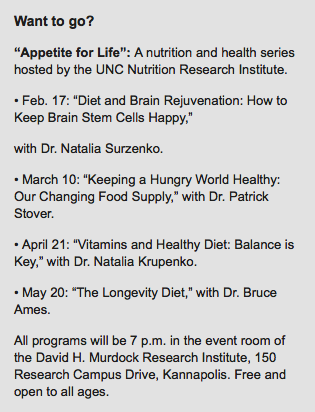Saturday, February 14, 2015
The following has been reprinted from Charlotte Observer, an article by Lisa Thornton.
If Dr. Natalia Surzenko told you that choline produces increased hippocampal neurogenesis in Mus musculus, you probably wouldn’t understand.
But if she said a nutrient called choline, naturally found in foods such as egg yolks, salmon and cocoa powder has been shown to regenerate brain cells responsible for increased memory in mice, that would be different.
At the UNC Nutrition Research Institute in Kannapolis, where Surzenko, a neurobiologist, has her lab, a new series called “Appetite for Life” is intended to create clearer dialogue between researchers and laypeople about discoveries changing the way experts view nutrition.
“The intent is to help tie the very complex research we are conducting at the NRI to everyday realities of local people,” said Suzanne Dane, director of community outreach and development at the institute.
Cancer-prevention expert Dr. Stephen Hursting kicked off the series last month with a conversation about the strong correlation between diet and the rising incidence of cancers. Four more experts will lead discussions in coming months covering topics that highlight advances in their understanding of nutrition, from vitamins that help stave off chronic diseases to those that slow the aging process.
All the programs are free to the public, suitable for most age groups and held on the North Carolina Research Campus in the event room of the David H. Murdock Research Institute in Kannapolis. Previous talks will be available on the UNC NRI’s website at www.uncnri.org/index.php/seminars.
On Feb. 17, Surzenko’s presentation, “Diet and Brain Rejuvenation: How to Keep Brain Stem Cells Happy” will show the benefits of choline in all phases of life, but especially in a pregnant woman’s diet.
 In her experiments, the babies of mice supplemented with choline outperformed those without on memory tasks, even throughout adulthood.
In her experiments, the babies of mice supplemented with choline outperformed those without on memory tasks, even throughout adulthood.
“When they grow up, they don’t get old in terms of their memory,” said Surzenko. “While the animals whose mothers didn’t have choline in their diet for a particular time during development become worse and worse, like the normal-aging animal.”
Studies also have shown choline levels in children can predict academic success. “The higher the levels, the better they perform in school,” she said.
Ongoing research is studying choline’s usefulness in the adult brain, too, and may someday help doctors reverse some of the memory loss associated with the normal aging process and through conditions like Alzheimer’s disease.
“These studies are ongoing and we hope that they will find that that’s true,” said Surzenko. “We don’t yet know for sure.”
The AFL lecture by Dr. Natalia Surzenko on February 17 was canceled due to poor weather conditions. Please visit www.uncnri.org/afl to learn when this talk will be rescheduled.
